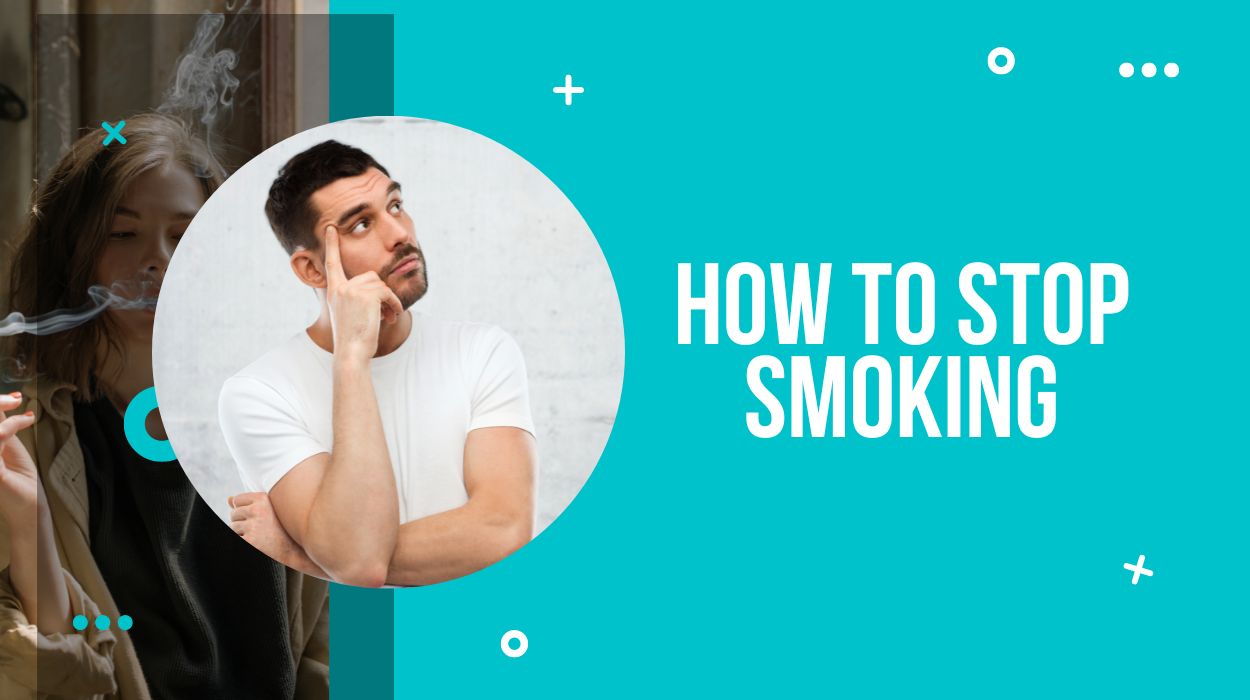Cigarettes are one of the world’s most widely used substances. In any given year, over one billion people smoke cigarettes, making tobacco the most commonly used drug in the world. Despite the well-documented health risks of smoking, millions of people continue to smoke cigarettes. Why do so many people smoke cigarettes?
Today, we will discover practical and everlasting habits you can create to stop smoking, go around its harmful effects, how it alternates your psychology and internal chemical balance, effective ways to stop smoking, and how you can retain from smoking ever again.
Why do people smoke?

Cigarettes are one of the most widely used substances in the world. In any given year, over one billion people smoke cigarettes, making tobacco the most commonly used drug in the world.
Millions of people continue to smoke cigarettes. Why do so many people smoke cigarettes?
Fortunately, there are resources available to assist smokers in quitting. The short answer is that it is difficult to stop. The long answer is that cigarettes are the most addictive substance legal in the United States. This is why so many people have tried to quit smoking and failed.
What are the biological and psychological processes that make people want to smoke?
When people smoke cigarettes, two of their endocrine glands – the adrenal cortex and the pituitary gland – release secretions that are called “stress hormones.” These stress hormones are a part of the body’s defense system, and they help the body adjust to stress by increasing muscle tension, blood pressure, heart rate, and breathing. When people smoke after exercising, they feel more “fit” and “strong.”
It may seem like stress hormones make you high. By contrast, “tobacco” is an alkaloid substance – a type of plant chemical. The smoke from tobacco products has been shown to contain nicotine, carbon monoxide, and other substances that can affect people’s moods, thinking, and emotions.
This action of smoking is most likely responsible for the “high” that people experience when they smoke. Research suggests that the “feel-good” chemical in the brain that is released when people smoke is called “dopamine.”
Dopamine is a type of neurotransmitter found in the brain, linked to sensations of pleasure, movement, and motivation. In the short-term, nicotine seems to increase the amount of dopamine in the brain.
For example, nicotine has been linked to feelings of relaxation and calmness. Over time, people who smoke cigarettes build up a tolerance to these effects, which is one of the reasons people continue to smoke. They need to smoke more and more to experience the same feeling.
How do the health effects of smoking compare to those of other drugs?

The health effects of smoking are well-known, and they are responsible for millions of deaths each year. The most common health effect of smoking is lung cancer, the leading cause of death from cancer in the United States.
Smoking’s severe other health effects include heart disease, stroke, emphysema, bronchitis and lung infections, bladder and kidney cancer, and erectile dysfunction.
In addition, smoking has been shown to decrease the immune system’s effectiveness, making people more susceptible to infection. Smoking lowers the amount of oxygen carried by the body, leading to a condition called “asthma.”
The list of health effects of smoking is long, and they are all linked to the impact of the stress hormones released when people smoke.
Many people think that smoking is harmless because we don’t see the harmful effects of tobacco when someone smokes it. But the effects of smoking are very harmful to the health of the body, and It can cause serious illnesses, including lung cancer, heart disease, and emphysema.
Smoking is one of the most hazardous activities that we do. And one of its dangerous effects is that it affects our heart. It can make the heart work too fast, making it hard for the blood to pump correctly.
Due to this, the body does not receive the oxygen and nutrients required. Smoking can produce blood clots, resulting in a heart attack or stroke.
Smoking also raises the chance of tuberculosis, eye infections, and immune system problems, such as rheumatoid arthritis.
A person who smokes cigarettes can develop lung cancer. It is one of the most dangerous ways to get lung cancer because the smoke in cigarettes causes cancer. The smoke contains harmful chemicals, including nicotine, tar, and carbon monoxide. When a person smokes, the smoke enters their lungs and causes cancer cells to grow.
Emphysema is one of the faces which gets listed on the wrong sides. It is a disease that causes the lungs to lose their elasticity, causing them to collapse. In addition, it is responsible for the airways in the lungs becoming narrow and damaged, which makes it harder to breathe.
Emphysema also weakens the chest muscles, making it hard for the person to breathe and causing them to suffer from chronic obstructive pulmonary disease. The most common symptoms of emphysema are coughing, fast or labored breathing, and wheezing.
1. Effects On females
Smoking affects not only men but also women. According to a new study published in the European Journal of Epidemiology, women who smoke more than 20 cigarettes per day have a three times more significant chance of developing early menopause. Women are more affected than men to develop COPD, lung cancer, and heart disease. Smoking can even cause infertility.
Women who smoke cigarettes have a significantly higher risk of giving premature birth and suffering from early menopause and may be at a higher risk for miscarriage or stillbirth than those who do not.
The effects of smoking on women are not as severe as they are on men. In contrast, when smoking, men’s lungs are damaged, their hearts get more robust, and they have less chance of getting diabetes, but women’s lungs are not as strong as men’s, and their heart condition gets worse, and their chances of getting diabetes are higher.
2. Smoking affects the unborn
Research shows that women who smoke during pregnancy are more likely to bear children with congenital disabilities, such as heart problems and respiratory problems. The damage can lead to the baby having a low weight birth weight and poor lung development.
There is a correlation between smoking and miscarriages, according to studies. Tobacco smoke contains carbon monoxide, preventing a developing fetus from getting adequate oxygen. Tobacco smoke carries additional toxins that are harmful to unborn children.
Women smokers have a higher risk of pre-term delivery and are more harmful to the baby than to the mother. Smoking during pregnancy might affect the tissue of the unborn baby, especially in the lungs and brain, and some research reveals a link between maternal smoking and cleft lip and palate.
Smoking causes women to have difficulty becoming pregnant and have a greater risk of not being pregnant again!
How to Stop Smoking?

People who smoke have tried many different things to help them stop smoking. These include: trying not to think about smoking, going to therapy, taking medication, not going out with friends, and going to meetings. Smokers who are ready to quit often use these strategies to help them stop. The problem is that these strategies don’t work for everyone.
You cannot just decide to quit smoking and then go back to smoking. Make sure to talk to a doctor or a therapist to know the best way to quit smoking. For most people, quitting smoking is a gradual process.
A good plan is to wean yourself off nicotine gradually. This means that you slowly reduce your nicotine intake. Most experts agree that smoking no more than ten cigarettes per day is enough to wean your body off nicotine.
Smoking is also a drug that can affect physical health, such as lung and heart. It is not as easy as it seems to decide to stop smoking. People who smoke tend to enjoy being high.
This is why they get addicted to smoking; they feel calm and relaxed when high. People who smoke are also in a great rush to get the next cigarette to ensure they have it while one is in their mouth.
If you want to stop smoking, you have to make a decision. If you’re going to quit smoking, you should be willing to take action.
Ways to Stop Smoking:

1. Making up your mind:
The first step in quitting is to be aware that the addiction has entered your psyche and realize that smoking makes you feel relaxed and calm. The next step is to think of the benefits of quitting to highlight the benefits and start making plans for stopping. The decision to quit smoking is often challenging and very frightening. But if you have a strong will to quit smoking, then there is a chance that you will quit smoking.
2. Natural ways:
No scientific studies show that nicotine replacement products are effective in helping people quit smoking. They are very effective in quitting smoking, but there are no health benefits from using nicotine replacement products. And the alternative can be fruits!
Fruits act as an effective and long-lasting way to quit smoking. However, many people believe that the natural way is the best way to quit smoking. The reason behind the natural way to quit smoking is that it does not contain any toxic chemicals that are harmful to the body. It is effective in reducing the dependency of the body.
Natural ways are based on the theory of “no harm.” And there are lots of case studies and research that have shown that the usage of fruits can help quit smoking. For example, bananas have a high content of potassium. Some people say that drinking a glass of warm water with two banana slices can help kick the cigarettes.
3. Side medicines:
If you have nicotine gum, patches, or inhalers, you may be able to quit smoking. You may want to start with smoking less and gradually reduce the amount of nicotine in your body. This can be done by you or even a counselor.
4. Build-up good habits:
On the first day that you stop smoking, you should feel a sense of excitement and a feeling of freedom! You should keep a list of all the things you should stop doing in your life and which day of the week. This is an excellent way to ensure that you will stick to the plan for quitting smoking.
Smoking is not as effective as people think it is. One of the main reasons people smoke is to want to relax. For example, if you want to relax, it is better to have a warm bath and drink a glass of warm water and two banana slices. This would give you an alternative to smoking and let you get off the habit.
5. Good friend circle and environment:
A theory says that people who quit smoking stay with new friends and keep away from their old friends who smoked at your house and made you smoke.
Most people who have quit smoking have one main thing in common; they have people in their lives that they can call and rely upon and share what they want. They have a good friend circle which makes it a substantial motivating factor for most people who want to quit smoking, and it is effective in helping them.
After you’ve quit smoking, there are a few things you should do
6. Being on track:
Quitting smoking is a big step in your life. But when you do, you will feel like you’ve been living on the mountain and that you can’t get off it. However, it is not valid. You can get off the hill, and you can recover.
If you quit smoking, you have to be careful not to develop any other addictions. People should only quit smoking if they know that they will not have any other habits. Some people develop an anxiety disorder in which they have to smoke to calm themselves. This is called smoking maintenance.
There are many instances where you grab the habit back even after quitting it. It seems that you have left it entirely, but deep inside, it can retain and revive itself. It is crucial for a former smoker to consistently maintain good habits to remain on the right track and not re-develop it.
Being in an excellent eco-friendly environment where the place doesn’t promote you to smoke again is one of the best remedies you can find out. Not hanging out late with your former smoker mates and keeping away from them that’s the undeniable thing you should do, which previously became the cause for your intensive smoking habit.
7. Making plans to stay concentrated:
After you quit smoking, you should keep a list of all you should do. You should include some things that you should do after quitting smoking and some places where you can go to divert yourself and focus on your daily life affairs. If you don’t own a list, you may forget what you should do in the future.
Start-up new ideas or the ones you left to act upon in the past. This may help involve yourself more in work to concentrate on the future goal of your life, which can also be done by watching the works of others.
FAQs
1. How Much Weight Will I Gain?
This isn’t true of everyone. It’s rare that people gain more than 10 pounds after quitting smoking. Maintain a nutritious diet, exercise regularly, and avoid allowing weight gain to detract from your primary aim of quitting smoking. Some anti-smoking drugs might cause weight gain.
2. I have a habit of smoking first thing in the morning. So, what’s next?
Change your routine when you initially try to quit smoking. Drink tea instead of coffee and eat breakfast somewhere else. To get to work, take a different path. The goal is to mix up your habits so that they don’t lead you back to smoking.
3. What if I’ve Already Tried?
It is still a possibility. Most people attempt to quit smoking at least two or three times before succeeding. Consider your previous attempts to quit. What worked for you? What went wrong? What are some things you change this time?
Remember that millions of individuals have successfully quit smoking. One of them may be you!
4. Are there any negative consequences to using nicotine replacement products?
Because nicotine replacement medications include a low, therapeutic dosage of nicotine, adverse effects such as vivid dreams are possible. When using the nicotine patch, some users may experience skin irritation.
5. How can I know if I’m not hooked on nicotine anymore?
The indications vary from person to person, but one way to know if your addiction is fading is when cigarettes are no longer an option. You’ll know you’ve won the battle when the things that used to make you reach for your pack no longer have any power over you.
Starting Afresh
Smoking is a habit that is difficult to break, but it is possible with the right help. The biological and psychological processes that make people want to smoke are complex, but they can be understood and managed. Once this is understood, people can develop strategies to help them quit. The most crucial thing is to have a plan and to follow through.


